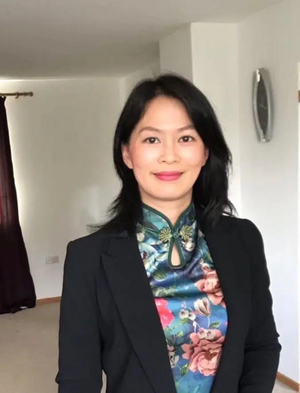Interview with Ms Yue He Parkinson, new CLD member
On International Women's Day, Chinese Lib Dems' Merlene Emerson interviewed our newest member, Ms Yue He Parkinson, about why she is interested in UK and China politics and her decision to join the party.
ME: Yue, could you tell us a bit about yourself, your background, education and career? When did you settle in the UK?
Yue: I was born, educated and worked in Canton, China, and moved to the UK in 2004 to study International Relations at the University of Bristol, and awarded an MSc. Since then, I have settled down in Portishead, Bristol with my family of 4. I am now working as a bilingual writer and author, and was invited by the BBC World Service to comment on Chinese politics in Dec 2022.
ME: What made you decide to go into politics yourself, first as a journalist writing about UK and China relations and now by joining a political party?
Yue: I have always been interested with politics, I studied politics at the University of Bristol, I have interviewed politicians, studied British history, and analysed politics and UK-Sino relations for over 8 years. It took me about 20 years to understand British politics and society, say democracy, freedom, equality, fairness, etc, as the politics and society in China ARE ABSOLUTELY DIFFERENT FROM British politics and society EXCEPT in the areas of trade, business and science where both share certain common languages. I now feel confident to get more involved in British politics. Also my two girls are over 10 now, so I am free to devote myself to my own interests.

ME: Did you consider joining any of the other major parties before joining the Liberal Democrats? What attracted you to the party?
Yue: Yes, I knew the Chinese organizations in the three parties from 2015 when I covered Chinese in British politics for BBC Chinese. For the majority of mainland Chinese immigrants, the only party that can get their attention must be the Conservatives, not only are they in power, but it is also the only party mainland Chinese immigrants are able to understand and accept. British society is kinder and fairer as compared to Chinese society, where you are reliant on yourself, and no one will help you unless you have money or power. It is an extremely hard and cruel social environment, no freedom of speech, no right to strike, etc. That's why I have always said that the British don't know how lucky they are.
Liberal Democrats embrace beliefs which I find are the best in the UK. It's in the middle way, not that conservative, not that labour either.
ME: I like that, describing the Lib Dems as in the middle way (very Chinese). What are your political ambitions, if any? Would you consider standing as a candidate in local or general elections yourself?
Yue: I don't think I am that ambitious as I have long way to catch up with the front line of British politics. Yet I am keen to stand as a candidate in local and general elections. I came from China where the focus is on people's duties and responsibilities, with few rights, opposite to British society where there's a higher degree of emphasis on human rights. The middle way - balanced with rights and duties are the best for the community - has been a dream to achieve, although I understand that often only extreme politics, right or left, can win most voters over.
ME: True. In general, the public and the media find it easier to consider polarised and popular views. Do you have any advice for people who are afraid of getting involved in politics? Or think that politics is not relevant to them (eg "The Mountain is high and the Emperor is far away" - Chinese proverb)?
Yue: There are many mainland Chinese immigrants in the UK, yet most of them dislike politics due to the education we received in China. Politics is seen as the business of the Communist party officers, hence the people lose interest in politics and are unable to understand that every political decision sets up the base for our daily lives. The second obstacle is mainland Chinese immigrants have been educated in China not to criticize the Chinese government - a dangerous move - which somehow was described by the government as intending to overthrow the government, so my British Chinese fellows are rarely daring to talk about Chinese politics even though they are living in the UK - a free land. See my piece on Why first-generation Chinese immigrants in the UK fear speaking up.
ME: We now have some new migrants too. What is your observation about the HK BNO immigrants?
Yue: About 150,000 HK BNO immigrants have arrived in the UK, and it was estimated that about 300,000 of them in total will be in the UK. There are about 100 HK households moving into Portishead, where I am based, and I get on well with them.
During a research for Wenzhou people in Europe I assisted and joined James Miles of the Economist in Paris and Prato Italy. I noticed some called themselves "the 1.5 generation of immigrant" because they immigrated to Europe in their teens. All of sudden I realized that I am very much like a 1.8 generation, perhaps that's why I recently found out I have much in common with the new Hongkong immigrants, who are like 1.5 generation, based on my Cantonese upbrings and nearly 20 years of learning about British society.
Note
Yue is a columnist for FT Chinese, writes for the South China Morning Post and Singapore newspaper Lianhezaobao.
